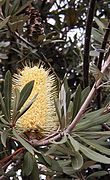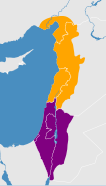Wikipedia:Today's featured article/May 2022
| << | Today's featured articles for May 2022 | >> | ||||
|---|---|---|---|---|---|---|
| Su | Mo | Tu | We | Th | Fr | Sa |
| 1 | 2 | 3 | 4 | 5 | 6 | 7 |
| 8 | 9 | 10 | 11 | 12 | 13 | 14 |
| 15 | 16 | 17 | 18 | 19 | 20 | 21 |
| 22 | 23 | 24 | 25 | 26 | 27 | 28 |
| 29 | 30 | 31 | ||||
May 1
The May Pamphlet is a collection of six anarchist essays written and published by Paul Goodman in 1945. He discusses the problems of living in a society that represses individual instinct through coercion. Goodman suggests for individuals to resist such conditions by reclaiming their natural instincts and initiative, and by "drawing the line", an ideological delineation beyond which an individual should refuse to conform or cooperate with social convention. Themes from The May Pamphlet—decentralization, peace, social psychology, and youth liberation—would recur throughout Goodman's works. Originally published piecemeal in small, New York anarchist journals (examples pictured) during and after World War II, the essays were not well known before Goodman's 1960 book Growing Up Absurd led a resurgence of interest in his oeuvre. The May Pamphlet was Goodman's main contribution to anarchist theory and a primary influence on Colin Ward, who later dedicated Anarchy in Action to Goodman's memory. (Full article...)
May 2
The 2021 World Snooker Championship was a professional snooker tournament that took place from 17 April to 3 May at the Crucible Theatre in Sheffield, England. It was the 45th consecutive year the World Snooker Championship was held at the Crucible Theatre and was the 15th and final ranking event of the 2020–21 snooker season. It was organised by the World Snooker Tour, a subsidiary of the World Professional Billiards and Snooker Association. The event was sponsored by sports betting company Betfred and broadcast by the BBC, Eurosport and Matchroom Sport. There were 128 participants in the qualifying rounds, consisting of a mix of professional and invited amateur players. The main stage of the tournament featured 32 players: the top 16 players from the snooker world rankings and an additional 16 players from the qualifying rounds. It featured a total prize fund of £2,395,000 of which the winner received £500,000. It was won by Mark Selby, who defeated Shaun Murphy 18–15 in the final. (Full article...)
May 3
Lorde (born 1996) is a New Zealand singer-songwriter known for employing unconventional musical styles and introspective songwriting. She signed with Universal Music Group (UMG) in 2009 and collaborated with producer Joel Little in 2011 to record material. The pair's first collaborative effort, an extended play titled The Love Club, was released by UMG in 2013, and its international chart-topping single "Royals" helped Lorde rise to prominence. Her debut studio album Pure Heroine followed that year and achieved critical and commercial success. The following year, she curated the soundtrack for the 2014 film The Hunger Games: Mockingjay, Part 1 and recorded several tracks, including the single "Yellow Flicker Beat". Her second studio album Melodrama (2017) garnered widespread acclaim and reached number one on the US Billboard 200. Lorde's music is primarily electropop and contains elements of subgenres such as dream pop and indie-electro. (This article is part of a featured topic: Overview of Lorde.)
May 4
The Empire Strikes Back is a 1980 American epic space opera film in the Star Wars series, directed by Irvin Kershner with a screenplay by Leigh Brackett and Lawrence Kasdan, and based on a story by George Lucas. Featuring an ensemble cast, the film recounts the battle between the malevolent Galactic Empire led by the Emperor, and the Rebel Alliance led by Princess Leia. Luke Skywalker trains to master the Force so he can confront the powerful Sith lord, Darth Vader. The Empire Strikes Back faced production difficulties, including actor injuries, illnesses, fires, and financing issues, as costs rose to $30.5 million from an initial budget of $8 million. This highly anticipated sequel became the highest-grossing film of 1980. Its reception was mixed because of the darker and more mature tone, but it has been reassessed as the best film in the series, and has been listed among the greatest films of all time. It has had a significant impact on filmmaking and popular culture. (Full article...)
May 5
G-8 and His Battle Aces was an American air-war pulp magazine published by Popular Publications from 1930 to 1944. Originally titled Battle Aces, it was retitled by Popular in 1933 after its hero, G-8, a top pilot and a spy, due to the success of Street & Smith's The Shadow, a magazine featuring a single character. Robert J. Hogan wrote the lead novels for all the G-8 stories, set in World War I, featuring the Germans threatening the Allies with extraordinary or fantastic schemes, such as giant bats, zombies, and Martians. Hogan and others wrote the short stories that filled the rest of each issue. The covers by Frederick Blakeslee are notable for their fidelity to planes flown in World War I. Originally a monthly, it began releasing an issue every two months shortly before World War II and ceased publication in 1944. Pulp historian Lee Server suggests that Hogan's talent as a writer kept the pulp alive, since by the last issue, in June 1944, the aircraft it featured had long been obsolete. (Full article...)
May 6
Banksia integrifolia is a species of tree that grows in Australia between Victoria and Central Queensland. One of the most widely distributed Banksia species, it has a broad range of habitats, from coastal dunes to mountains. It is highly variable in form, but most often encountered as a tree up to 25 metres (82 ft) in height. Its leaves have dark green upper surfaces and white undersides. It is one of the four Banksia species collected by Sir Joseph Banks in early 1770, and one of the four species published in 1782 as Carolus Linnaeus the Younger's original description of the genus. A hardy and versatile garden plant, B. integrifolia is widely planted in Australian gardens. It is a popular choice for parks and streetscapes, and has been used for bush revegetation and stabilisation of dunes. Its hardiness has prompted research into its suitability for use as a rootstock in the cut flower trade, but has also caused concerns about its potential to become a weed outside its natural habitat. (Full article...)
May 7
Daisy Pearce (born 1988) is an Australian rules footballer playing for the Melbourne Football Club in the AFL Women's (AFLW) competition. Often regarded as the face of women's Australian rules football, Pearce has served as Melbourne captain starting with the AFLW's inaugural season in 2017. Pearce began her playing career in 2005 in the Victoria state league with the Darebin Falcons, captaining the club from 2008 to 2016. She represented Victoria at both under-19 and senior levels, and was recruited by Melbourne in 2013 for the first women's exhibition game. Pearce is a three-time AFL Women's All-Australian, having been named captain in the 2017 team and vice-captain in the 2018 team. She is a three-time Melbourne best and fairest winner and a four-time AFLW's best captain, having won the latter in four of her five completed AFLW seasons. Pearce is an established media personality on both television and radio. She is an expert commentator for the Seven Network and 1116 SEN's AFL coverage. (Full article...)
May 8
Interstate 196 (I-196) is an auxiliary interstate highway that runs for 80.6 miles (129.7 km) in the US state of Michigan. It is a state trunkline highway that links Benton Harbor, South Haven, Holland, and Grand Rapids. I-196 is known as the Gerald R. Ford Freeway in Kent, Ottawa, and Allegan counties, after the 38th president of the United States, who was raised in Grand Rapids and served Michigan in the House of Representatives. There are two business loops (BL I-196) and one business spur (BS I-196) that serve the South Haven, Holland, and Grand Rapids areas. The current I-196 is the second in the state to bear the number. The Benton Harbor–Grand Rapids freeway was designated I-96 in the 1950s while another interstate, between Muskegon and Grand Rapids, was numbered I-196. That I-196 was built in the late 1950s and completed in the early 1960s. Michigan officials requested a change in 1963, which switched the two numbers. (This article is part of a featured topic: Interstate 96.)
May 9
The double florin, or four-shilling piece, was produced by the Royal Mint between 1887 and 1890, and was one of the shortest-lived of all denominations of British coinage. Its obverse, designed by Joseph Boehm and engraved by Leonard Charles Wyon, depicts Queen Victoria, whilst the reverse (pictured), featuring national symbols of the United Kingdom, was designed by Wyon based on the coinage of Charles II. When issued in June 1887, the Jubilee coinage, of which the double florin was a part, provoked an outcry. The small royal crown Boehm had depicted on Victoria's head provoked widespread mockery. The double florin was criticised as it was similar in size to the crown, worth five shillings, which led to confusion. The issue was said to be particularly acute in public houses, where barmaids accepted it believing it to be a crown, giving it the nickname "Barmaid's Ruin". The coin was no longer minted after 1890, though it remained in circulation for many years, and is still legal tender for 20 pence (£0.20). (Full article...)
May 10
Abu Mansur Nizar ibn al-Mustansir (1045–1095) was a Fatimid prince and the eldest son of al-Mustansir, an Isma'ili imam and the eighth Fatimid caliph. When al-Mustansir died in December 1094, the powerful vizier, Al-Afdal Shahanshah, raised Nizar's younger brother Al-Musta'li to the throne in Cairo, bypassing the claims of Nizar and other older sons of al-Mustansir. Nizar escaped, rebelled and seized Alexandria, where he reigned as caliph with the regnal name al-Mustafa li-Din Allah. In late 1095, he was defeated, taken prisoner and executed by immurement. During the 12th century, some of Nizar's actual or claimed descendants tried, without success, to seize the throne from the Fatimid caliphs. Many Isma'ilis, especially in Persia, rejected al-Musta'li and considered Nizar to have been the rightful imam. As a result, they split off from the Fatimid regime and founded the Nizari branch of Isma'ilism, with their own line of imams who claimed descent from Nizar. This line continues to this day in the person of the Aga Khan. (Full article...)
May 11
The queen angelfish (Holacanthus ciliaris) is a species of marine angelfish found in the western Atlantic Ocean. It is a warm-water species that lives near the ocean floor in coral reefs. It is blue and yellow and has a distinctive spot or "crown" on its forehead. This crown distinguishes it from the similar, closely related, Bermuda blue angelfish, with which it overlaps in range and can interbreed. Adult queen angelfish primarily eat sponges. They form harems of one male and up to four females. They live within a territory where the females forage separately and are tended to by the male. Breeding occurs near a full moon. The transparent eggs are pelagic and float in the water, hatching after 15 to 20 hours. Juveniles have different coloration than adults and act as cleaner fish. The queen angelfish is popular in the aquarium trade. In 2010, the fish was assessed as a least-concern species by the International Union for Conservation of Nature. (Full article...)
May 12
The dispute between Darnhall and Vale Royal Abbey arose in the early fourteenth century. Tensions in Cheshire between villagers from Darnhall and Over and their feudal lord, Abbot Peter of Vale Royal Abbey, erupted into violence over whether they had villein—servile—status. The villagers' efforts to reject the Abbey's feudal overlordship included appeals to the Abbot, the Justice of Chester and even to the King and Queen. On each occasion the villagers were unsuccessful, frequently suffering imprisonment and fines when their appeals failed. On one occasion the villagers of Darnhall and Over followed Peter to Rutland; an affray broke out, the Abbot's groom was killed and Peter and his entourage were captured. The King intervened and released him; the Abbot then had the villagers imprisoned again. Abbot Peter was killed a few years later. Nothing is known of any resolution to the dispute, but serfdom was in decline nationally and Peter's successor may have had other priorities. (Full article...)
May 13
"I'm Goin' Down" is a rock song written and performed by American singer Bruce Springsteen (pictured). The song was recorded with the E Street Band on May 12–13, 1982, and was released on August 27, 1985, by Columbia Records as the sixth single from his 1984 album Born in the U.S.A. Although Springsteen had changing ideas about the songs to put on the album, "I'm Goin' Down" was ultimately selected for inclusion. The recording is based on an energetic band performance that gives prominence to a heavy drum sound. The lyrics focus on sexual frustration in a deteriorating relationship. The single reached number 9 in the United States and the top 30 in Sweden, Canada, and Italy. On the album's release, the song was praised by critics for the band's musicianship and Springsteen's vocals and lyrics. Later it received favorable rankings in retrospectives of Springsteen's career, among which was an NME list calling it his fourth-best song. (Full article...)
May 14
The 1987 FA Cup Final was an association football match between Coventry City and Tottenham Hotspur on 16 May 1987 at Wembley Stadium in London to determine the winner of the 1986–87 FA Cup. It was the third final for Tottenham Hotspur in seven years and Coventry's first domestic cup final. Both clubs recorded songs to commemorate reaching the final. With the game tied 2–2 at full time, the match went into extra time. The only goal of extra time was scored in its first period when a cross from Lloyd McGrath looped off Gary Mabbutt's left knee for an own goal, making the final score 3–2 to Coventry. The match is regarded by many as one of the greatest finals in the history of the competition, with BBC TV commentator John Motson calling it "the finest Cup Final I've had the pleasure of commentating on". The 1987 FA Cup remains Coventry's only major tournament victory. One of Coventry's fanzines is entitled Gary Mabbutt's Knee in commemoration of the deciding goal. (Full article...)
May 15
Sjafruddin Prawiranegara (1911–1989) was an Indonesian statesman and economist. He became active in politics after an education in law, and joined the Indonesian nationalist movement during the Japanese occupation of 1942–1945. He was appointed finance minister in the republican government during the Indonesian National Revolution of 1945–1949. In December 1948, the Indonesian revolutionary leaders were captured and Sjafruddin served as head of government for seven months. After Indonesia's independence he first served as deputy prime minister, then again as finance minister until 1951. A pragmatic policymaker, he espoused religious socialism based on a liberal interpretation of Islam; he was a staunch opponent of communism. Sjafruddin's opposition to the government's system of Guided Democracy resulted in his leading three years of guerrilla warfare, which ended with his surrender in 1961. Imprisoned until 1966, he became a vocal critic of the Indonesian government until his death in 1989. (Full article...)
May 16
The Saline Valley salt tram is located in Inyo County, California. The electric aerial tramway was constructed from 1911 to 1913 to carry salt from the Saline Valley, over the Inyo Mountains, and into the Owens Valley. Covering a distance of 13.4 miles (21.6 km), it operated sporadically from 1913 to 1935 for four different companies. The tram was built for the Saline Valley Salt Company (SVSC) by the Trenton Iron Company, but the costs of its construction and operation were ruinously expensive for the SVSC. The salt mining operation and tram were leased in 1915 to the Owens Valley Salt Company until the latter went bankrupt in 1918. In 1920, the tram was taken over by the Trenton Iron Company, which sold it to the Sierra Salt Company in 1928. The Sierra Salt Company put it back into service until the company went bankrupt in 1935. During its operation, it was the steepest tram in the United States. The tram was included in the National Register of Historic Places in 1974. (Full article...)
May 17
Colossal Cave Adventure is a 1976 text-based adventure game by Will Crowther, based on his own spelunking experience, and expanded in 1977 by Don Woods. In it, the player explores a vast cave system rumored to be filled with treasure and gold, by typing one- or two-word commands. These are interpreted by the game's natural language input system. The program acts as a narrator, describing the player's location and the results of the player's attempted actions. It is the first well-known example of interactive fiction, as well as the first well-known adventure game, for which it was also the namesake. The version by Woods expanded the game in size and increased the amount of fantasy elements present in it, such as a dragon and magic spells. Both versions were spread around the nascent ARPANET, the precursor to the Internet, and were very popular in the computer community. Noted as one of the most influential video games, it was in 2019 inducted into the World Video Game Hall of Fame. (Full article...)
May 18
The Pyramid of Sahure is a pyramid complex built in the late-26th to 25th century BC for the Egyptian pharaoh Sahure of the Fifth Dynasty. The main pyramid was built from roughly hewn limestone blocks bound with mud mortar and encased with fine white Tura limestone. Stone fragments believed to belong to the king's basalt sarcophagus are the only remains of the burial that have been found. A mortuary temple is adjacent to the pyramid's east face and to the south is a cult pyramid, constructed similarly to the main pyramid but on a reduced scale. The layout of the complex was adopted by succeeding kings of the Fifth and Sixth Dynasties, marking a milestone in pyramid complex construction. Sahure's mortuary temple became the object of a cult of Sekhmet around the Eighteenth Dynasty. The cult was active through to the Ptolemaic Kingdom. The temple also became the site of a Coptic shrine. The site was first thoroughly excavated by Ludwig Borchardt between March 1907 and 1908. (Full article...)
May 19

Eduard Fraenkel (1888–1970) was a German classical scholar who served as Corpus Christi Professor of Latin at the University of Oxford from 1935 until 1953. Born to a family of assimilated Jews in the German Empire, he studied classics at the Universities of Berlin and Göttingen. He established his academic reputation in 1922 with the publication of a monograph on Plautus, a Roman comedian. In 1934, antisemitic legislation introduced by the Nazi Party forced him to seek refuge in England. He published a three-volume commentary in 1950 on Agamemnon by the Greek playwright Aeschylus (pictured), and a monograph in 1957 on the Roman poet Horace. Biographers place particular emphasis on the impact of his teaching at Oxford, where he led a weekly classical seminar that influenced the intellectual development of many undergraduates. The Hellenist Hugh Lloyd-Jones described Fraenkel as "one of the most learned classical scholars of his time". (Full article...)
May 20
The Battle of Heraklion was fought during World War II on the island of Crete between 20 and 29 May 1941. British, Australian and Greek forces defended the port and the airfield of Heraklion against a German paratrooper attack. The German assault was launched without direct air support, and drops occurred over several hours rather than simultaneously. German units dropping near Heraklion (pictured) suffered very high casualties; those dropping further away were severely hampered by Cretan partisans. The German attack failed. When it was renewed the next day it failed again. The fighting then settled into a stalemate. A convoy of German seaborne reinforcements was intercepted by a British naval squadron and scattered. The Germans refocused on the battle for Maleme airfield, which they won, causing the Allies to evacuate. Commonwealth troops were taken off Crete by Allied warships on the night of 28/29 May; at sea, two Allied destroyers were sunk and two cruisers badly damaged, causing many casualties. (Full article...)
May 21
Cirrus clouds are atmospheric clouds characterized by thin, wispy strands, often bunched into tufts. They range in color from white to faint gray and form when water vapor undergoes deposition at altitudes above 5,000 m (16,500 ft) in temperate regions and above 6,000 m (20,000 ft) in tropical regions. They also form from the outflow of tropical cyclones or the anvils of cumulonimbus clouds. Since these cirrus clouds arrive in advance of the frontal system or tropical cyclone, they indicate that the weather conditions may soon deteriorate. While they can indicate the arrival of precipitation, cirrus clouds themselves produce only fall streaks (falling ice crystals that evaporate before landing on the ground). Jet streams can stretch cirrus clouds across continents, but the clouds will remain only a few kilometers deep. When visible light interacts with the ice crystals in cirrus clouds, it can produce glories, sun dogs, and fire rainbows. (Full article...)
May 22
The geology of the Lassen volcanic area in the U.S. presents a record of sedimentation and volcanic activity in and around Lassen Volcanic National Park in Northern California. Heat from the subduction of tectonic plates has fed scores of volcanoes over at least the past 30 million years, including those in the Lassen volcanic area. Lava flowed over a lahar-based formation to create the lava plateau that the park sits on. About 600,000 years ago, Mount Tehama started to rise in the park's southwest corner. Roughly 27,000 years ago, a lava dome pushed through Tehama's former flank, becoming Lassen Peak. Phreatic (steam-blast) eruptions, lava flows, and cinder cone formations have persisted into modern times, particularly the formation of Cinder Cone and the 1914 to 1921 eruptions of Lassen Peak (eruption pictured). Since the latter eruptions, the only volcanic activity has been from mud pots and fumaroles. Renewed vigorous volcanic activity could threaten life and property in the area. (Full article...)
May 23
Turtles are reptiles characterized by a shell developed mainly from their ribs. The shell consists of two parts: the domed carapace on the back, and the flatter plastron on the belly. There are 360 living and recently extinct turtle species, including land-dwelling tortoises and freshwater terrapins. They are found on most continents, some islands and, in the case of sea turtles, much of the ocean. Their closest living relatives are crocodilians and birds. Turtles are ectotherms or "cold-blooded", meaning that their internal temperature varies with their direct environment. They are generally opportunistic omnivores and mainly feed with limited movements. Turtles lay their eggs on land; sea turtles migrate long distances to lay their eggs on a favored beach. Turtles have appeared in myths and folktales. Some species are widely kept as pets. Turtles have been hunted for their meat and shells, and for use in traditional medicine. Many species are threatened due to habitat destruction. (Full article...)
May 24
Edmund I (920/921–946) was King of the English from 939 until his death. He was a son of King Edward the Elder and his third wife Eadgifu, and a grandson of Alfred the Great. Edmund's predecessor and half-brother Æthelstan had become the first king of all England when he conquered Viking-ruled York in 927, but on his death Anlaf Guthfrithson seized control of York and north-east Mercia. Edmund recovered control over all England in 944. He continued his brother's friendly relations with Continental rulers; some were married to his half-sisters. Key advisers include his mother and Ealdorman Æthelstan of East Anglia, known as the Half-King because he was so powerful. Edmund actively legislated. Three of his codes survive; they regulated feuds and emphasised the sanctity of the royal person. Edmund supported the religious English Benedictine Reform in its early stages. After a deranged thief killed him in a brawl he was succeeded by his younger brother Eadred (d. 955) and two sons in succession. (Full article...)
May 25
The Clonmacnoise Crozier is a late-11th-century Insular crozier that would have been used as a ceremonial staff for bishops and high-status abbots. Discovered before 1821 in the monastery of Clonmacnoise in County Offaly, Ireland, it consists of a shaft and curved crook, decorated with elements of Viking art. It may have been associated with Saint Ciarán of Clonmacnoise (died c. 549), and was perhaps commissioned by Tigernach Ua Braín (died 1088), Abbot of Clonmacnoise, but little is known of its origin or rediscovery. Largely intact, it is one of the best preserved pieces of Insular metalwork. The antiquarian and collector Henry Charles Sirr, Lord Mayor of Dublin, held it until the Royal Irish Academy acquired his collection on his death in 1844. It was transferred to the archaeology branch of the National Museum of Ireland on Kildare Street on the branch's foundation in 1890. The archaeologist and art historian Griffin Murray has described it as "one of [the] finest examples of early medieval metalwork from Ireland". (Full article...)
May 26
The Seagram Building is a 38-story skyscraper at 375 Park Avenue, located between 52nd and 53rd Streets in the neighborhood of Midtown Manhattan in New York City. It was the headquarters of the Seagram Company, a Canadian distiller, until 2001. It was designed by Ludwig Mies van der Rohe, Philip Johnson, Ely Jacques Kahn, and Robert Allan Jacobs in the International Style, and completed in 1958. Measuring 515 feet (157 m) tall, it has a glass curtain wall exterior with vertical mullions of bronze and horizontal spandrels made of Muntz metal. A pink granite plaza with two fountains faces Park Avenue; its construction helped influence a zoning ordinance that allowed developers to construct additional floor area in exchange for including plazas outside their buildings. Since 2000, Aby Rosen's RFR Holding has owned the Seagram Building. Elements of it were designated official city landmarks in 1989; the building was added to the National Register of Historic Places in 2006. (Full article...)
May 27

The Battle of Vrbanja Bridge occurred on 27 May 1995 between United Nations peacekeepers from the French Army and elements of the Bosnian Serb–aligned Army of Republika Srpska (VRS). It began after the VRS seized French-manned observation posts of the United Nations Protection Force at both ends of the Vrbanja Bridge in Sarajevo, Bosnia and Herzegovina, during the Bosnian War, taking twelve French peacekeepers hostage. Two of them remained held at the bridge as human shields. A platoon of 30 French peacekeepers, led by then-Captain François Lecointre, recaptured the bridge with the support of 70 French infantrymen and direct fire from armoured vehicles. Two French soldiers were killed and seventeen were wounded during the battle. VRS casualties were four killed, several wounded and four captured. VRS forces were subsequently less likely to engage French UN peacekeepers deployed in the city. In 2017, Lecointre was appointed Chief of the Defence Staff of France with the rank of army general. (Full article...)
May 28
Pan Am Flight 7 was a westbound round-the-world flight operated by Pan American World Airways that crashed in the Pacific Ocean on November 8, 1957, while flying from San Francisco International Airport to Honolulu International Airport. The crash of the Boeing 377 Stratocruiser 10-29 (example pictured) killed all thirty-six passengers and eight crew members. The flight's fate was not known until about nine hours after its last radio transmission. No emergency radio reports were received. The United States Coast Guard launched an extensive week-long search for the plane and survivors. The bodies of 19 of the victims and pieces of the aircraft were eventually recovered about 900 nautical miles (1,000 mi; 1,700 km) northeast of Honolulu. Although theories about the cause of the crash included sabotage, poor maintenance, and fire, the final report from the Civil Aeronautics Board, who conducted the official investigation, concluded that the board did not have enough evidence to determine the cause of the accident. (Full article...)
May 29
Everywhere at the End of Time is the eleventh recording by the Caretaker, an alias of English electronic musician Leyland Kirby (pictured). Released between 2016 and 2019, its six studio albums use gradually degrading sampled loops of ballroom music to portray the progression of Alzheimer's disease. The albums were inspired by the success of Kirby's An Empty Bliss Beyond This World (2011); they reflect the patient's disorder and death, their feelings, and the phenomenon of terminal lucidity. At first, concerned that the series would seem pretentious, Kirby thought of not creating Everywhere at all; he spent more time producing it than any of his other releases. He used abstract paintings by his friend Ivan Seal as album covers and made music videos with anonymous visual artist Weirdcore. The series received increasing acclaim as it progressed, and is considered one of the best music releases of the 2010s. It was later popularised on TikTok and became an Internet meme. (Full article...)
May 30
The Papuan mountain pigeon (Gymnophaps albertisii) is a species of bird in the pigeon family Columbidae. It inhabits forests and lowlands on New Guinea, the Bacan Islands, the D'Entrecasteaux Islands, and the Bismarck Archipelago. It is a medium-sized pigeon, 33–36 cm (13–14 in) long and weighing 259 g (9.1 oz). Adult males have slate-grey upperparts, chestnut-maroon throats and bellies, whitish breasts, and a pale grey tail band. The lores and eye rings are bright red. Females are similar, but have greyish breasts and edges to the throat feathers. This pigeon feeds on figs and drupes. In the Schrader Range it breeds from October to March, but elsewhere may breed throughout the year. It builds a nest of sticks in a tree or in short dry grass, and lays a single egg. The species is very social and is usually seen in flocks of 10–40 birds, sometimes more. It is listed as a least-concern species on the IUCN Red List due to its large range and lack of significant population decline. (Full article...)
May 31
Levantine Arabic is a mutually intelligible group of vernacular Arabic varieties spoken in the Levant, in Syria, Jordan, Lebanon, Palestine, Israel, and Turkey. With more than 44 million speakers, Levantine is, alongside Egyptian, one of the two prestige varieties of spoken Arabic most widely understood in the Arab world. It is the closest vernacular Arabic variety to the official Modern Standard Arabic (MSA), with half of all words being common. Nevertheless, Levantine and MSA are not mutually intelligible. Levantine speakers often call their language al-ʿāmmiyya ('slang' or 'colloquial Arabic') and until recently it was rarely written. However, with the emergence of social media, the amount of written Levantine has significantly increased online where Levantine is written using Arabic, Latin, or Hebrew characters. Levantine pronunciation varies greatly along social, ethnic, and geographical lines. Its grammar and lexicon are overwhelmingly Arabic, with a significant Aramaic influence. (Full article...)


























